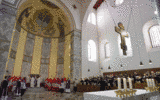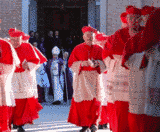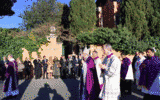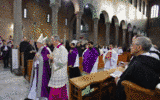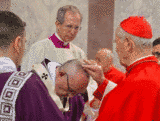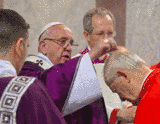
Lent 2017
Pope Francis's Message
(cf Heb 10, 24) - in Arabic, Chinese (China), Chinese (Taiwan), English, French, German, Italian, Polish, Portuguese & Spanish
“The Word is a gift. Other persons are a gift”
Dear Brothers and Sisters,
Lent is a new beginning, a path leading to the certain goal of Easter, Christ’s victory over death. This season urgently calls us to conversion. Christians are asked to return to God “with all their hearts” (Joel 2, 12), to refuse to settle for mediocrity and to grow in friendship with the Lord. Jesus is the faithful friend who never abandons us. Even when we sin, he patiently awaits our return; by that patient expectation, he shows us his readiness to forgive (cf Homily, 8 January 2016).
Lent is a favourable season for deepening our spiritual life through the means of sanctification offered us by the Church: fasting, prayer and almsgiving. At the basis of everything is the word of God, which during this season we are invited to hear and ponder more deeply. I would now like to consider the parable of the rich man and Lazarus (cf Lk 16, 19-31). Let us find inspiration in this meaningful story, for it provides a key to understanding what we need to do in order to attain true happiness and eternal life. It exhorts us to sincere conversion.
1. The other person is a gift
The parable begins by presenting its two main characters. The poor man is described in greater detail: he is wretched and lacks the strength even to stand. Lying before the door of the rich man, he fed on the crumbs falling from his table. His body is full of sores and dogs come to lick his wounds (cf v 20-21). The picture is one of great misery; it portrays a man disgraced and pitiful.
The scene is even more dramatic if we consider that the poor man is called Lazarus: a name full of promise, which literally means God helps. This character is not anonymous. His features are clearly delineated and he appears as an individual with his own story. While practically invisible to the rich man, we see and know him as someone familiar. He becomes a face, and as such, a gift, a priceless treasure, a human being whom God loves and cares for, despite his concrete condition as an outcast.
Lazarus teaches us that other persons are a gift. A right relationship with people consists in gratefully recognizing their value. Even the poor person at the door of the rich man is not a nuisance, but a summons to conversion and to change. The parable first invites us to open the doors of our hearts to others because each person is a gift, whether it be our neighbour or an anonymous pauper. Lent is a favourable season for opening the doors to all those in need and recognizing in them the face of Christ. Each of us meets people like this every day. Each life that we encounter is a gift deserving acceptance, respect and love. The word of God helps us to open our eyes to welcome and love life, especially when it is weak and vulnerable. But in order to do this, we have to take seriously what the Gospel tells us about the rich man.
2. Sin blinds us
The parable is unsparing in its description of the contradictions associated with the rich man (cf v 19). Unlike poor Lazarus, he does not have a name; he is simply called “a rich man”. His opulence was seen in his extravagant and expensive robes. Purple cloth was even more precious than silver and gold, and was thus reserved to divinities (cf Jer 10, 9) and kings (cf Jg 8, 26), while fine linen gave one an almost sacred character. The man was clearly ostentatious about his wealth, and in the habit of displaying it daily: “He feasted sumptuously every day” (v 19). In him we can catch a dramatic glimpse of the corruption of sin, which progresses in three successive stages: love of money, vanity and pride (cf Homily, 20 September 2013).
The Apostle Paul tells us that “the love of money is the root of all evils” (1 Tim 6, 10). It is the main cause of corruption and a source of envy, strife and suspicion. Money can come to dominate us, even to the point of becoming a tyrannical idol (cf Evangelii Gaudium, 55). Instead of being an instrument at our service for doing good and showing solidarity towards others, money can chain us and the entire world to a selfish logic that leaves no room for love and hinders peace.
The parable then shows that the rich man’s greed makes him vain. His personality finds expression in appearances, in showing others what he can do. But his appearance masks an interior emptiness. His life is a prisoner to outward appearances, to the most superficial and fleeting aspects of existence (cf ibid 62).
The lowest rung of this moral degradation is pride. The rich man dresses like a king and acts like a god, forgetting that he is merely mortal. For those corrupted by love of riches, nothing exists beyond their own ego. Those around them do not come into their line of sight. The result of attachment to money is a sort of blindness. The rich man does not see the poor man who is starving, hurting, lying at his door.
Looking at this character, we can understand why the Gospel so bluntly condemns the love of money: “No one can be the slave of two masters: he will either hate the first and love the second, or be attached to the first and despise the second. You cannot be the slave both of God and of money” (Mt 6, 24).
3. The Word is a gift
The Gospel of the rich man and Lazarus helps us to make a good preparation for the approach of Easter. The liturgy of Ash Wednesday invites us to an experience quite similar to that of the rich man. When the priest imposes the ashes on our foreheads, he repeats the words: “Remember that you are dust, and to dust you shall return”. As it turned out, the rich man and the poor man both died, and the greater part of the parable takes place in the afterlife. The two characters suddenly discover that “we brought nothing into the world, and we can take nothing out of it” (1 Tim 6, 7).
We too see what happens in the afterlife. There the rich man speaks at length with Abraham, whom he calls “father” (Lk 16, 24.27), as a sign that he belongs to God’s people. This detail makes his life appear all the more contradictory, for until this moment there had been no mention of his relation to God. In fact, there was no place for God in his life. His only god was himself.
The rich man recognizes Lazarus only amid the torments of the afterlife. He wants the poor man to alleviate his suffering with a drop of water. What he asks of Lazarus is similar to what he could have done but never did. Abraham tells him: “During your life you had your fill of good things, just as Lazarus had his fill of bad. Now he is being comforted here while you are in agony” (v 25). In the afterlife, a kind of fairness is restored and life’s evils are balanced by good.
The parable goes on to offer a message for all Christians. The rich man asks Abraham to send Lazarus to warn his brothers, who are still alive. But Abraham answers: “They have Moses and the prophets, let them listen to them” (v 29). Countering the rich man’s objections, he adds: “If they will not listen either to Moses or to the prophets, they will not be convinced even if someone should rise from the dead” (v 31).
The rich man’s real problem thus comes to the fore. At the root of all his ills was the failure to heed God’s word. As a result, he no longer loved God and grew to despise his neighbour. The word of God is alive and powerful, capable of converting hearts and leading them back to God. When we close our heart to the gift of God’s word, we end up closing our hearts to the gift of our brothers and sisters.
Dear friends, Lent is the favourable season for renewing our encounter with Christ, living in his Word, in the Sacraments and in our neighbour. The Lord, who overcame the deceptions of the Tempter during the forty days in the desert, shows us the path we must take. May the Holy Spirit lead us on a true journey of conversion, so that we can rediscover the gift of God’s word, be purified of the sin that blinds us, and serve Christ present in our brothers and sisters in need. I encourage all the faithful to express this spiritual renewal also by sharing in the Lenten Campaigns promoted by many Church organizations in different parts of the world, and thus to favour the culture of encounter in our one human family. Let us pray for one another so that, by sharing in the victory of Christ, we may open our doors to the weak and poor. Then we will be able to experience and share to the full the joy of Easter.
From the Vatican, 18 October 2016
Papa Francis' Homily at Mass on Ash Wednesday
at the Basilica of St Sabina on the Aventine Hill
1 March 2017 - in English, French, German, Italian, Polish, Portuguese & Spanish
"“Return to me with all your heart… return to the Lord” (Jl 2, 12,13). The prophet Joel makes this plea to the people in the Lord’s name. No one should feel excluded: “Assemble the aged, gather the children, even infants at the breast, the bridegroom… and the bride” (v 16). All the faithful people are summoned to come and worship their God, “for he is gracious and merciful, slow to anger and abounding in steadfast love” (v 13).
We too want to take up this appeal; we want to return to the merciful heart of the Father. In this season of grace that begins today, we once again turn our eyes to his mercy. Lent is a path: it leads to the triumph of mercy over all that would crush us or reduce us to something unworthy of our dignity as God’s children. Lent is the road leading from slavery to freedom, from suffering to joy, from death to life. The mark of the ashes with which we set out reminds us of our origin: we were taken from the earth, we are made of dust. True, yet we are dust in the loving hands of God, who has breathed his spirit of life upon each one of us, and still wants to do so. He wants to keep giving us that breath of life that saves us from every other type of breath: the stifling asphyxia brought on by our selfishness, the stifling asphyxia generated by petty ambition and silent indifference – an asphyxia that smothers the spirit, narrows our horizons and slows the beating of our hearts. The breath of God’s life saves us from this asphyxia that dampens our faith, cools our charity and strangles every hope. To experience Lent is to yearn for this breath of life that our Father unceasingly offers us amid the mire of our history.
The breath of God’s life sets us free from the asphyxia that so often we fail to notice, or become so used to that it seems normal, even when its effects are felt. We think it is normal because we have grown so accustomed to breathing air in which hope has dissipated, the air of glumness and resignation, the stifling air of panic and hostility.
Lent is the time for saying no. No to the spiritual asphyxia born of the pollution caused by indifference, by thinking that other people’s lives are not my concern, and by every attempt to trivialize life, especially the lives of those whose flesh is burdened by so much superficiality. Lent means saying no to the toxic pollution of empty and meaningless words, of harsh and hasty criticism, of simplistic analyses that fail to grasp the complexity of problems, especially the problems of those who suffer the most. Lent is the time to say no to the asphyxia of a prayer that soothes our conscience, of an almsgiving that leaves us self-satisfied, of a fasting that makes us feel good. Lent is the time to say no to the asphyxia born of relationships that exclude, that try to find God while avoiding the wounds of Christ present in the wounds of his brothers and sisters: in a word, all those forms of spirituality that reduce the faith to a ghetto culture, a culture of exclusion.
Lent is a time for remembering. It is the time to reflect and ask ourselves what we would be if God had closed his doors to us. What would we be without his mercy that never tires of forgiving us and always gives us the chance to begin anew? Lent is the time to ask ourselves where we would be without the help of so many people who in a thousand quiet ways have stretched out their hands and in very concrete ways given us hope and enabled us to make a new beginning?
Lent is the time to start breathing again. It is the time to open our hearts to the breath of the One capable of turning our dust into humanity. It is not the time to rend our garments before the evil all around us, but instead to make room in our life for all the good we are able to do. It is a time to set aside everything that isolates us, encloses us and paralyzes us. Lent is a time of compassion, when, with the Psalmist, we can say: “Restore to us the joy of your salvation, sustain in us a willing spirit”, so that by our lives we may declare your praise (cf Ps 51, 12.15), and our dust – by the power of your breath of life - may become a “dust of love”."
Papa Francesco's words at the Angelus on the 1st Sunday of Lent
St Peter's Square, Sunday 5 March 2017 - in Arabic, English, French, Italian, Portuguese & Spanish
"Dear Brothers and Sisters, Good morning!
In this First Sunday of Lent, the Gospel introduces us to the journey toward Easter, revealing Jesus as he remains in the desert for 40 days, subjected to the temptations of the devil (cf. Mt 4:1-11). This episode takes place at a precise moment in Jesus’ life: immediately after his Baptism in the River Jordan and prior to his public ministry. He has just received the solemn investiture: the Spirit of God has descended upon him, the heavenly Father has declared him “my beloved Son” (Mt 3:17). Jesus is now ready to begin his mission; and as this mission has a declared enemy, namely, Satan, He confronts him straight away, “up close”. The devil plays precisely on the title “Son of God” in order to deter Jesus from the fulfillment of his mission: “If you are the Son of God” (4:3, 6); and proposes that He perform miraculous acts — to be a “magician” — such as transforming stones into bread so as to satiate his hunger, and throwing himself down from the temple wall so as to be saved by the angels. These two temptations are followed by the third: to worship him, the devil, so as to have dominion over the world (cf. v. 9).
Through this three-fold temptation, Satan wants to divert Jesus from the way of obedience and humiliation — because he knows that in this way, on this path, evil will be conquered — and to lead Him down the false shortcut to success and glory. But the devil’s poisonous arrows are “blocked” by Jesus with the shield of God’s Word (vv. 4, 10), which expresses the will of the Father. Jesus does not speak a word of his own: He responds only with the Word of God. Thus the Son, filled with the power of the Holy Spirit, comes out of the desert victorious.
During the 40 days of Lent, as Christians we are invited to follow in Jesus’ footsteps and face the spiritual battle with the Evil One with the strength of the Word of God. Not with our words: they are worthless. The Word of God: this has the strength to defeat Satan. For this reason, it is important to be familiar with the Bible: read it often, meditate on it, assimilate it. The Bible contains the Word of God, which is always timely and effective. Someone has asked: what would happen were we to treat the Bible as we treat our mobile phone?; were we to always carry it with us, or at least a small, pocket-sized Gospel, what would happen?; were we to turn back when we forget it: you forget your mobile phone — ‘oh! I don’t have it, I’m going back to look for it’; were we to open it several times a day; were we to read God’s messages contained in the Bible as we read telephone messages, what would happen? Clearly the comparison is paradoxical, but it calls for reflection. Indeed, if we had God’s Word always in our heart, no temptation could separate us from God, and no obstacle could divert us from the path of good; we would know how to defeat the daily temptations of the evil that is within us and outside us; we would be more capable of living a life renewed according to the Spirit, welcoming and loving our brothers and sisters, especially the weakest and neediest, and also our enemies.
May the Virgin Mary, perfect icon of obedience to God and of unconditional trust in his will, sustain us on the Lenten journey, that we may set ourselves to listen docilely to the Word of God in order to achieve a true conversion of heart.
The Angelus .........
Dear brothers and sisters, I address a cordial greeting to the families, parish groups and all the pilgrims who have come from Italy and from various countries.
A few days ago we began Lent, which is the journey of the People of God toward Easter, a journey of conversion, of struggling against evil with the weapons of prayer, of fasting, and of works of charity. I hope that the Lenten journey may bear a wealth of fruit for everyone; and I ask you to remember to pray for me and for the collaborators of the Roman Curia, who this evening will begin the week of Spiritual Exercises. A heartfelt thank-you for the prayers that you will offer.
And please, do not forget — do not forget! — what would happen were we to treat the Bible as we treat our mobile phone. Think about this: the Bible always with us, close to us!
I wish you a happy Sunday! Enjoy your lunch! Arrivederci!"

